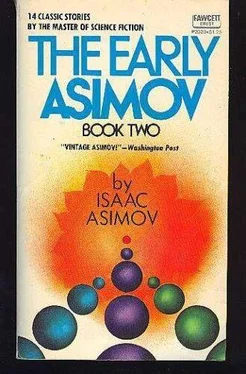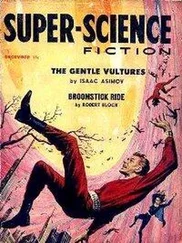Isaac Asimov - The Early Asimov. Volume 2
Здесь есть возможность читать онлайн «Isaac Asimov - The Early Asimov. Volume 2» весь текст электронной книги совершенно бесплатно (целиком полную версию без сокращений). В некоторых случаях можно слушать аудио, скачать через торрент в формате fb2 и присутствует краткое содержание. Год выпуска: 1986, ISBN: 1986, Издательство: Del Rey, Жанр: Фантастика и фэнтези, на английском языке. Описание произведения, (предисловие) а так же отзывы посетителей доступны на портале библиотеки ЛибКат.
- Название:The Early Asimov. Volume 2
- Автор:
- Издательство:Del Rey
- Жанр:
- Год:1986
- ISBN:ISBN: 034-532589-3
- Рейтинг книги:5 / 5. Голосов: 1
-
Избранное:Добавить в избранное
- Отзывы:
-
Ваша оценка:
- 100
- 1
- 2
- 3
- 4
- 5
The Early Asimov. Volume 2: краткое содержание, описание и аннотация
Предлагаем к чтению аннотацию, описание, краткое содержание или предисловие (зависит от того, что написал сам автор книги «The Early Asimov. Volume 2»). Если вы не нашли необходимую информацию о книге — напишите в комментариях, мы постараемся отыскать её.
The Early Asimov. Volume 2 — читать онлайн бесплатно полную книгу (весь текст) целиком
Ниже представлен текст книги, разбитый по страницам. Система сохранения места последней прочитанной страницы, позволяет с удобством читать онлайн бесплатно книгу «The Early Asimov. Volume 2», без необходимости каждый раз заново искать на чём Вы остановились. Поставьте закладку, и сможете в любой момент перейти на страницу, на которой закончили чтение.
Интервал:
Закладка:
By the time I was writing 'Super-Neutron,' in February of 1941,1 had heard of uranium fission and had even discussed it in some detail with Campbell. I managed to refer to it in the course of the story as 'the classical uranium fission method for power.' I also spoke of the metal cadmium as a neutron absorber. It wasn't bad for a story that appeared in 1941, and I sometimes quote it in public to create an impression.
Notice, though, that in the same paragraph in which I mention fission, I also talk of 'masurium.' Actually, masurium was the name given to element # 43 in 1926, but that discovery had proven a false alarm. The element was really discovered in 1937 and was given the now-accepted name of 'technetium.' It seems, then, that I could look years into the future and see uranium fission,as a practical power source, but I couldn't look a few years into the past and see the correct name for element #43.
This brings us to March 17, 1941, and one of the key turning points of my literary career.
By that day, I had written thirty-one stories. Of these I had already sold seventeen and was yet to sell four more. Of all these stories, three perhaps, and no more, were to turn out to be of more than ephemeral value, and those were the three 'positronic robots' stories I had so far written: 'Robbie,' 'Reason' and 'Liar!'
Looking back on my first three years as a writer, then, I can judge myself to be nothing more than a steady and (perhaps) hopeful third-rater. What's more, that's all I considered myself then, too. Nor did anyone else, at that time, seriously consider me as a potential first-magnitude star in the science fiction heavens - except, maybe, Campbell.
What are the odds, then, that on March 17, 1941, I would sit down and write something that for thirty years now has been considered by a surprising number of people to be the outstanding short classic of magazine science fiction? It was one of those things that couldn't possibly happen - yet it did.
It began when I walked into Campbell 's office that day and, as usual, suggested an idea. What it was I don't remember, but whatever it was he turned it down instantly, not because it was such a bad idea but because he had something he wanted to show me that crowded everything else out of his mind. He had come across a quotation from Ralph Waldo Emerson that went: 'If the stars should appear one night in a thousand years, how would men believe and adore, and preserve for many generations the remembrance of the city of God! ' [10]
Campbell asked me what I thought would happen if the stars would appear at only very long intervals. I had nothing intelligent to suggest.
'I think men would go mad,' he said thoughtfully.
We talked about that notion for quite a while, and I went home to write a story on the subject, one that Campbell and I decided from the start was to be called 'Nightfall.'
I began it that night. I can remember the details exactly: my parents' apartment on Windsor Place in Brooklyn, across the street from the candy store; my own room, just next to the living room, is clear in my mind, with the position of my bed, my desk, my typewriter - and myself getting started.
In years to come, fans would occasionally vote in polls designed to decide the best science fiction short stories of all time. Quite frequently, 'Nightfall' would finish in first place. Just a couple of years ago, the Science Fiction Writers of America polled their membership to decide the best science fiction short stories ever published, for inclusion in a Hall of Fame anthology. "Nightfall' finished in first place by a sizable margin. And, of course, it has been anthologized a dozen times so far.
With all this, one might argue that 'Nightfall' is the best (or at least the most popular) short science fiction story ever to appear in the magazines. Well, I often wonder, with a shudder, what might have happened on the evening of March 17, 1941, if some angelic spirit had whispered in my ear, 'Isaac, you are about to start writing the best short science fiction story of our time.'
I would undoubtedly have frozen solid. I wouldn't have been able to type a word.
But we don't know the future, and I tapped away blissfully, writing the story and completing it by April 9, 1941. That day, I submitted it to Campbell. He asked for a small revision. I took care of that, and on April 24, 1941, he bought the story.
It set several records for me. It was the longest story I had yet sold, a little over thirteen thousand words. Since Campbell paid me a bonus (my first one), the word rate was one and a quarter cents a word, and the total check was for $ 166, more than twice as large as any single payment I had ever before received. [11]
Then, too, 'Nightfall' appeared in the September 1941 issue of Astounding as the lead novelette. For the first time, I made the cover of that magazine, with 'Nightfall, by Isaac Asimov' in large, bold letters.
Most important of all, the appearance of 'Nightfall' graduated me by common consent (three years after I had begun my career) into the list of first-rank science fiction writers.
Alas, the story is not included here. It appears (of course) in Nightfall and Other Stories. [12]
The excitement of writing 'Nightfall' and Campbell 's hearty and unqualified praise of it ought, one might think, to have set me furiously to work at the typewriter, but it didn't. Spring 1941 was a bad time for me.
I could at any time that half year have left Columbia with a master's degree, but that would have done me no good. I had no job to go to, so I could only mark time and try to raise my value to some prospective employer by going on to the big one, the doctorate.
But that meant I had to take a series of elaborate, interminable 'qualifying examinations,' which I had to pass in order to be allowed to begin research without which I could not get the Ph.D. Passing was difficult and I didn't feel prepared at all, but I had to try it sometime, and besides, if I didn't fall short by too far, I would be allowed to continue taking courses and to repeat the qualifying examinations at some future date.
So in May I absented myself from the typewriter, studied earnestly for my qualifyings, took them - and didn't pass. I did well enough to earn the option of a future repeat, and I also received my M.A. as a kind of consolation prize, but I was badly disheartened all the same.
(And in the larger world outside, though Great Britain had survived air bombardment, Hitler still seemed unstoppable. He invaded the Balkans and was again winning spectacular victories, and that was disheartening, too.)
It was not till May 24, 1941, that I could bring myself to go back to my writing. I turned out 'Not Final!' which I submitted to Campbell on June 2. It was accepted on the sixth, but without a bonus.
Not Final! [13]
Nicholas Orloff inserted a monocle in his left eye with all the incorruptible Briticism of a Russian educated at Oxford and said reproachfully, 'But, my dear Mr. Secretary! Half a billion dollars!'
Leo Birnam shrugged his shoulders wearily and allowed his lank body to cramp up still farther in the chair, 'The appropriation must go through, commissioner. The Dominion government here at Ganymede is becoming desperate. So far, I've been holding them off, but as secretary of scientific affairs, my powers are small.'
'I know, but -' and Orloff spread his hands helplessly.
'I suppose so? agreed Birnam. 'The Empire government finds it easier to look the other way. They've done it consistently up to now. I've tried for a year now to have them understand the nature of the danger that hangs over the entire System, but it seems that it can't be done. But I'm appealing to you, Mr. Commissioner. You're new in your post and can approach this Jovian affair with an unjaundiced eye.'
Читать дальшеИнтервал:
Закладка:
Похожие книги на «The Early Asimov. Volume 2»
Представляем Вашему вниманию похожие книги на «The Early Asimov. Volume 2» списком для выбора. Мы отобрали схожую по названию и смыслу литературу в надежде предоставить читателям больше вариантов отыскать новые, интересные, ещё непрочитанные произведения.
Обсуждение, отзывы о книге «The Early Asimov. Volume 2» и просто собственные мнения читателей. Оставьте ваши комментарии, напишите, что Вы думаете о произведении, его смысле или главных героях. Укажите что конкретно понравилось, а что нет, и почему Вы так считаете.







